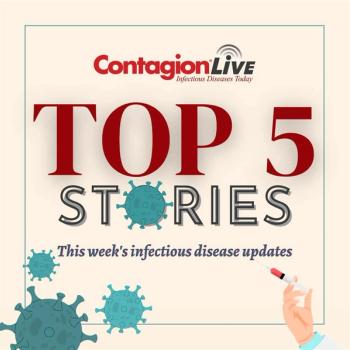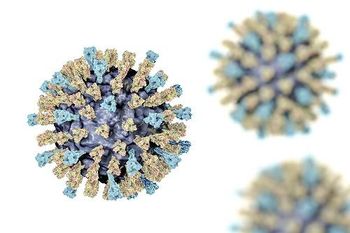
Emily Ricotta, PhD, MSc, discusses how observational studies shape early decisions and address challenges in infectious disease outbreaks

Emily Ricotta, PhD, MSc, discusses how observational studies shape early decisions and address challenges in infectious disease outbreaks

In a statement, the official, Ralph Abraham, MD, along with the state’s deputy surgeon general, wrote that because of “COVID missteps” they will no longer encourage vaccination to people.

This week, five all-oral TB regimens showed efficacy, fungal biofilm diseases remain challenging, over 2 million pastries were recalled due to contamination, and more.

In the Phase 3 trial, GSK's vaccine met all 11 primary endpoints, providing expanded options for preventing invasive meningococcal disease in individuals aged 10-25 years.

The approval is based on positive phase 3 clinical trial results, offering an effective option for travelers and others at risk of chikungunya, the mosquito-borne illness.

Su H Wang, MD, FACP, MPH discusses combating vaccine misinformation, preventing outbreaks, and highlighting global health interconnectedness

Su H Wang, MD, FACP, MPH, cautions that the US withdrawal from the WHO and cuts to critical health programs may reverse progress in global health, with vulnerable populations being particularly at risk.

As a result of an independent committee’s determination, the study has been discontinued.

Kei Sato, PhD, provides insights into the factors driving the spread and immune resistance of the LP.8.1 SARS-CoV-2 variant across different countries.

An inoculum effect in methicillin-susceptible S aureus infective endocarditis is suspected factor in higher all-cause 30-day mortality with cephazolin treatment than with oxacillin.

Carlien Pohl-Albertyn's, PhD research highlights the role of the South African brown locust in the transmission and survival of the emerging pathogen Candida auris.

A decreasing number of researchers and open positions for infectious disease clinicians and limited residency matches are underlying issues that should be addressed to meet the needs around antimicrobial development and clinical care. Amesh Adalja, MD, FIDSA, discusses some of the challenges behind it.

Hannah Pye, PhD and Evelien Adriaenssens, PhD explore the potential of phages in combating antimicrobial resistance and advancing health across human, animal, and environmental domains.

Twenty-four cases have been identified within the last two weeks, and 22 of those cases are in children. Nine of the cases have required hospitalization.

Professor Gordon Ramage, BSc, PhD, discusses the increasing impact of fungal biofilms, new treatment options, and the need for enhanced detection methods.

The new version of its molecular test targets the causes of gastroenteritis.

Heather Platt, MD, discusses Merck’s latest achievement with Capvaxive and its potential to significantly reduce invasive pneumococcal disease and pneumonia in high-risk adult populations across Europe.

The affected person had a mild case and is recovering.

FDA investigates ongoing outbreaks involving contaminated pastries with 18 reported cases of illness across 7 states, and 1 hospitalization.

Targeted therapies represent a promising evolution in infectious disease treatment, offering precision approaches to combat resistant pathogens while addressing key limitations in traditional broad-spectrum treatments.

The Centers for Disease Control and Prevention (CDC) is preparing for staff cuts and the Trump Administration may be withholding public health information in one of the agency's publications, which can impact disclosing health information being seen by providers and other stakeholders.

Carole Mitnick, ScD discusses the impact of the endTB trial's findings on future TB treatment options, including shorter treatment durations, lower costs, and expanded accessibility.

Carole Mitnick, ScD highlights the importance of trust in the success of the endTB trial and addresses the ongoing toxicity concerns with new shorter treatment regimens.

This week, a study on children with invasive candidiasis showed that switching treatment was just as effective, AI is being explored as a tool to combat AMR, and more.

There are concerns around norovirus risks associated with a certain harvest from Louisiana.

This combination antibiotic is indicated for adults with limited or no treatment options, including gram-negative infections. It will be available in the third quarter of this year.

Kirsten Nielsen, PhD, discusses how her team’s research could lead to better understanding and treatment of cryptococcal meningitis.

The association’s Executive Director Georges Benjamin, MD, offers some commentary as to why they have concerns around him as Health and Human Services Secretary.

Researchers identify Camp Hill virus, a novel henipavirus in shrews, raising concerns about human exposure to emerging infectious diseases.

The antimicrobial resistance (AMR) crisis stems from natural microbial adaptation and the lack of new antimicrobials in development. Vulnerable populations worldwide, including within the US, are disproportionately affected, exacerbating the spread of resistance.